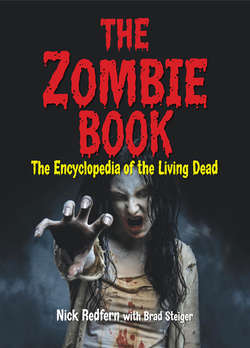Читать книгу The Zombie Book - Nick Redfern - Страница 19
На сайте Литреса книга снята с продажи.
Armageddon See also: Apocalypse, End Times, Megiddo, Norwegian Armageddon
ОглавлениеWhen a fictional zombie outbreak occurs, there is always at least one character that believes the rise of the dead is the work of an angry God, one that decides to punish the living by raising the dead. In other words, the war against the zombies becomes a confrontation of definitively religious proportions. Rather interestingly, over the course of the last decade or so, the Pentagon has quietly and carefully promoted the idea that the War on Terror is not just a battle against bearded maniacs from the Middle East, but a confrontation of biblical proportions, one that is a fight between good and evil, God and Satan. Of course, the reality is that the War on Terror is simply the latest conflict of many that have always plagued the human race and, in all likelihood, always will plague us. But, that has not stopped Uncle Sam from seeding meme-like messages to the effect that this war is very different from all previous wars.
In January 2010, a great deal of press and television coverage was given to a very strange development in the War on Terror: the U.S. Marine Corps signed a contract with a company called Trijicon—based out of Wixom, Michigan—which provided rifle sights containing inscribed quotes from the Bible. And we’re not talking about a handful of sights: it was in excess of three quarters of a million of them, which netted Trijicon a nice sum of $650 million.
The Death and Conflagration by Albert Chmielowski is a circa 1870 oil painting that was part of the triptych Disaster that captures the mood of Armageddon quite poignantly.
Despite the fact that many might see this as a positive thing, official regulations exist specifically, and quite rightly, banning the promotion of any and all religious belief in both Afghanistan and Iraq, specifically to prevent claims being made that the War on Terror is a religious one. Inscribing the following onto the sights was hardly perceived in many quarters as keeping the hostilities deity-free: “For God, who commanded the light to shine out of darkness, hath shined in our hearts, to give the light of the knowledge of the glory of God in the face of Jesus Christ.” Significantly, additional quotes came from the Book of Revelation—a book that perhaps far more than a few people might turn their attentions to if the dead really do rise from the grimy soil below.
It was this development that got Michael Weinstein, of the Military Religious Freedom Foundation (MRFF), in a state of rage. He said: “It’s literally pushing fundamentalist Christianity at the point of a gun against the people that we’re fighting. We’re emboldening an enemy.” He had a point: senior military personnel were referring to the weapons equipped with the saintly sights as a “spiritually transformed firearm of Jesus Christ.” Such was the furor that all of this provoked, Trijicon took two new steps: (a) they had the messages removed from those sights still in their factory; and (b) they provided what were described as modification kits to allow for the removal of the references from the already deployed optical sights.
“We must ensure that incidents like these are not repeated, so as not to give the impression that our country is involved in a religious crusade, which hurts America’s image abroad and puts our soldiers in harm’s way,” said Haris Tarin, Director of the Washington, D.C. office of the Muslim Public Affairs Council.
